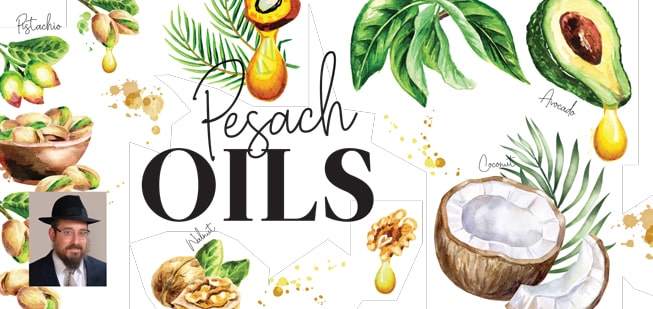OIL IS A LIQUID WITH UNIQUE PROPERTIES THAT MAKE IT DIFFERENT FROM ALL OTHER LIQUIDS. OIL IS EXTRACTED BY CRUSHING AND SQUEEZING THE SOURCE TO RELEASE THE VALUABLE OIL INSIDE. WHEN IT IS SPILLED, OIL SPREADS OUT AND IS NOT READILY ABSORBED BY EVEN A POROUS SURFACE. OIL DOES NOT MIX WHEN IT IS COMBINED WITH OTHER LIQUIDS AND IT RISES TO THE TOP OF WHATEVER LIQUID WITH WHICH IT IS COMBINED.
The Lubavitcher Rebbe writes1 about oil as it compares to the Jewish people in Exile. Like oil, the Jewish people have undergone crushing challenges that brought out inner greatness. Like oil, the Jewish people have spread out across the world and disseminated the wellsprings of the Torah wherever we have gone. Just as oil remains apart from other liquids, the Jewish people retain our unique character and traditions, remaining true to Torah and mitzvos. And finally, the Jewish people rise above the mundane, elevating even worldly pursuits, like the oil that rises to the top of all other liquids. Even in the difficult Golus of Mitzrayim, the Jewish people remained true to these properties, which led to our salvation as Hashem took us out of Mitzrayim and chose us to be His Nation.
When it comes to Passover certified food items, the fewer steps involved in the production, the lesser the chance of Pesach related challenges. This is true both commercially and in home-based settings.
For those Sefardim with the custom of eating kitniyot on Pesach, the following oils can potentially be used when certified for Pesach “l’ochlei kitniyot” by a reliable hechsher: canola, soybean, sunflower, peanut2, and corn. Canola, soybean, and sunflower oils may be problematic even though they are derived from kitniyot sources because there is a possibility that they have been grown in fields that also grow wheat on a rotating basis. These oils require a reliable hechsher for Passover kitniyot use. A reliable kashrus agency knows to check the gluten level of the crude oil as part of the process in determining whether or not it can be approved l’ochlei kitniyot.
It is not enough to ascertain that the source of the oil is kosher l’Pesach; the production process, from start to finish, needs to conform to Pesach requirements.
In general, edible oils are derived from fruits, vegetables, plants, flowers, or nuts, and generally via one of two methods – pressing or refining. Refined oils, in their original form, are called crude and they undergo a multi-step process to remove any impurities before they reach your grocer’s shelves. Since refinery equipment is very difficult to clean, the certifying agency must ensure that the equipment is acceptable for Pesach use at every step along the way. Very often, refined oils for Pesach are done on a production basis, which means that special runs are made for kosher l’Pesach oils.
THE 4 GENERAL STEPS INVOLVED IN THE REFINING PROCESS ARE:
DEGUMMING – improves edibility and storage, and enables the neutralization step in the refining process
NEUTRALIZATION – alkaline agents are added so that the fatty acids in the oil will bind to them and create a soap-like substance, which can then be removed
BLEACHING – agents are added to help remove color
DEODORIZATION – live steam is added under vacuum conditions to help remove any undesirable flavors and odors
When it comes to food production, if the product is made on a dedicated line it is easier to certify kosher. For example, palm oil is suitable for Pesach use (with a reliable hechsher) even though it is refined because it is typically produced on dedicated equipment along with a very basic ingredient that is suitable for Pesach.
Pressed oils, as the term implies, are derived from a straightforward process that involves squeezing the source to extract the oil, which can be done cold or using heat extraction. After the oil is extracted, it is filtered to remove impurities and debris. From a quality perspective, the cold process helps preserve the original properties of the oil’s source. Since cold pressing is a straightforward process that does not involve the use of other ingredients and/or shared processes with other non-Pesach products, as long as the source is not chometz or kitniyot, cold-pressed oils are ideal for Pesach use. In addition, because these oils contain only a single ingredient, they can often be certified for Pesach year-round. Some examples are extra virgin olive oil, pistachio oil, coconut oil, and avocado oil.
The most commonly used oils for Pesach are cottonseed3, grapeseed, olive, walnut, avocado, coconut, and palm. This year, we can add OK-P-certified pistachio oil, a newly released product by Setton International, to the list.
Due to the limited choice of ingredients for Pesach, one of the biggest challenges we face in the kitchen is creating tasty and nutritious meals with ingredients that conform to family customs. We are lucky to have an abundance of Kosher for Passover products available in our stores, but they are often variations of the same base products. Even when something new hits the market for Pesach, it is often just another version or application of a product already on the shelves. Therefore, when a truly new and unique kosher for Pesach product enters the market, it is a cause for excitement.
Already well known for its high-quality pistachios, nuts, and dried fruit, Setton International recently launched a kosher for Pesach pistachio oil, just in time for this year’s Pesach season. Now, for the first time, kosher consumers can avail themselves of this unique new product which is already on track to becoming a household staple, not only for Pesach but for year-round use as well.
While there are many kosher for Pesach oils on the market, pistachio oil is unique. Some of the kosher l’Pesach oils you are most likely familiar with are cottonseed, walnut, olive, avocado, and grapeseed. Due to the stringencies associated with Pesach, many people prefer oils that are minimally processed, and while some of these oils are cold-pressed and, therefore, more mehudar in terms of processing, others are hot expelled in a more detailed process, making them less desirable options. Also, nut-based oils that are kosher for Pesach are typically distilled (another level of processing) to remove the aromas and flavors attributed to the nuts from which they are made.
The Setton family has gone to great lengths to ensure a top-quality product that is produced following the most stringent Pesach standards. To start, Setton Farms produces its pistachio oil using only raw, unprocessed premium pistachios from their farms in California’s Central Valley. Produced on dedicated equipment, the oil is handcrafted in small batches to ensure freshness, quality, and consistency. It is light green, has an attractive aroma, and the well-balanced flavor doesn’t overpower the food in which it’s used. The pistachio oil has a low smoke point, making it ideal for use in cold applications such as dressings, dips, salads, and as a finishing oil.
In terms of health benefits, pistachios are known to be a complete protein food high in antioxidants and a natural source of Vitamins A, B6, E, as well as Omega 6 and 9. Due to the minimal processing of the pistachios, pistachio oil retains many health benefits associated with pistachios because you are truly getting only raw pistachios, in oil form.
In conclusion, may we be zocheh to live elevated lives and, like oil, rise to the top in our avodas Hashem and in our quest to bring Moshiach.
KITNIYOT is a loshon hakodesh word meaning legumes; however, when used in connection with Pesach, it also includes foods such as rice, corn, and millet, as well as seeds such as kimmel, mustard and sesame. Ashkenazim and some Sephardim are prohibited from consuming kitniyot on Pesach based on rabbinic rulings which originated in Europe over 700 years ago.
The two main reasons for these rulings are because kitniyot and the five grains closely resemble each other when they grow in the fields, and also because kitniyot can be prepared in a way that resembles food made from the five grains which are prohibited on Pesach in any form other than matzah specially prepared for Pesach. There is also a concern in some cases that kitniyot crops can be rotated with chometz crops in the same field, and this would be problematic for Pesach.
1. Igros Kodesh, Volume 2, page 279.
2. The minhag is to consider this oil kitniyot (see Igros Moshe Orach Chaim, vol. 3, Teshuva 63).
3. The Minchas Yitzchak (Vol. 3, page 240 and Vol. 4, page 248) holds that cottonseed oil should not be consumed on Pesach.
Rabbi Yitzchak Hanoka is a Rabbinic Coordinator with the OK Kosher Certification.


 EN
EN  ZH
ZH  KR
KR  BR
BR  ES
ES  IN
IN  IL
IL 




